As the Nasdaq Entrepreneurial Center helps celebrate the 10th anniversary of Unshackled Ventures and National Immigrants Day, we’re excited to spotlight one of Unshackled Ventures’ funded founders, Akshay Chintalapati, the visionary behind Dysun Inc. Akshay’s journey in the clean energy sector began during his time at companies like Tesla and SunPower, where he recognized a critical challenge: while demand for solar and storage systems was growing, support teams were overwhelmed, and installers and homeowners struggled to get timely assistance. This bottleneck slowed the adoption of clean energy solutions, prompting Akshay to take action. With support from Unshackled Ventures, Akshay founded Dysun Inc., developing innovative tools that not only boost productivity for installers but also ease the burden on support staff, helping to accelerate the transition to a cleaner, more sustainable future.
What does “entrepreneurship” mean to you?
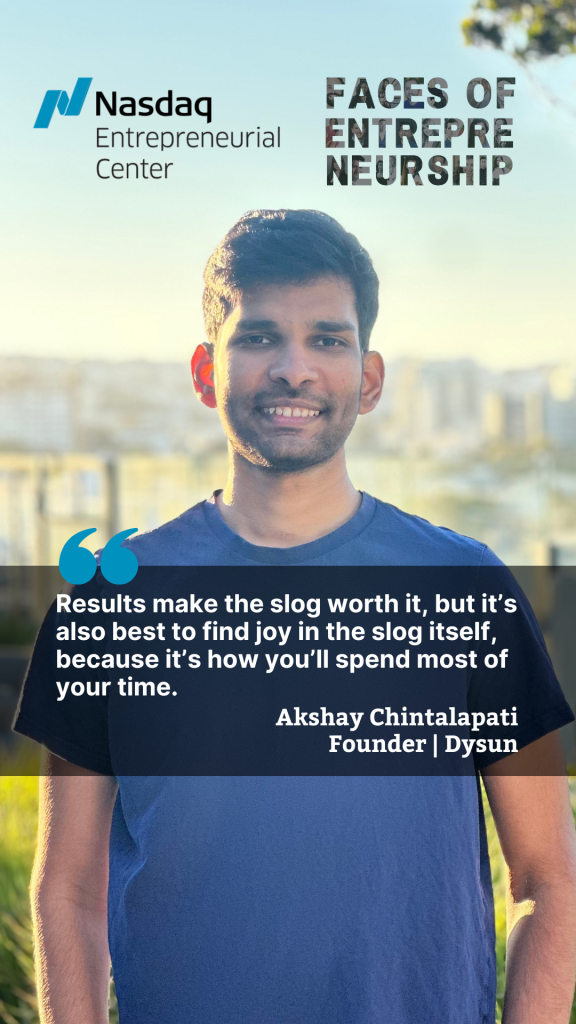 Akshay Chinalapati: Zooming out a little, how I view what most companies I admire fall into two categories, ones that are 1) creating more opportunities for fulfillment, or 2) solving problems that hold us back. That’s what shapes what entrepreneurship means to me; it is about finding an unaddressed problem or opportunity, allocating resources, taking risks, and building something people want or need, one that objectively makes their lives better.
Akshay Chinalapati: Zooming out a little, how I view what most companies I admire fall into two categories, ones that are 1) creating more opportunities for fulfillment, or 2) solving problems that hold us back. That’s what shapes what entrepreneurship means to me; it is about finding an unaddressed problem or opportunity, allocating resources, taking risks, and building something people want or need, one that objectively makes their lives better.
Tell us about your first experience with entrepreneurship.
AC: An early significant experience was when I first learnt about Apple through a Steve Jobs’ biography in the form of a comic that my dad gave me when I was 11 or 12. Reading how one person started a company, lost it, then ran two other companies, and came back to not only save Apple from dying but went on to make it incredibly successful was crazy to me – that one person could do it all.
What is your company’s origin story? What is the biggest reason you started your business? What did those early days look like and teach you?
AC: It originated from a consistent pattern I noticed while working at three different companies in the solar and storage industry. In each role, I worked closely with both field teams installing systems and remote support teams helping these installers and customers. At each of these companies, the support staff were significantly outnumbered by those needing help. This created a painful bottleneck where technicians and customers couldn’t get timely support, while support staff faced burnout from being perpetually stretched thin. Seeing this same problem repeat across multiple companies made me realize this wasn’t just a company-specific issue, but a wider industry challenge that needed solving.
What do you wish you knew when you started? Is there anything you would do differently?
AC: Two lessons: 1) that planning is useful but plans aren’t, and 2) that the market always wins. I spent what I now consider an excessive amount of time making a detailed plan for my initial product and customer segment. When I hit roadblocks that forced me to pivot to a different customer segment, I realized much of that planning time was wasted. This same experience also made me realize the size of the market really matters – you need to operate in large markets, even if you’re starting with a small segment, because all things considered, you’ll expend the same amount of effort whatever market you target, with roughly similar odds, so it’s better to target one that has a large upside.
What does “success” look like for you? We’d love to hear your biggest, boldest dream. What do you think will help you achieve it?
AC: Success to me is building something that qualitatively improves the lives of millions. That’s why I focus on large markets – it’s not about business potential, it’s primarily about the opportunity to positively impact more people.
What is your superpower as an entrepreneur? What is your proudest and darkest moment so far? Share a key high and a key low from your journey if you can.
AC: One thing I’ve found has served me really well is figuring out the right questions to ask. The best moment was landing my first customer, and ironically, working with them led to my lowest point when I realized I needed to change direction. While that pivot has so far proven valuable in retrospect, it was a difficult moment at the time.
What are your personal driving principles, your top values?
AC: Empathy, optimism about the future, always learning
How have your personal principles and values shaped your company’s values and principles? Give us some examples.
AC: Being empathetic helps me listen objectively when talking to users, helping separate real problems from my own assumptions. And optimism? That’s what gets you through the constant rejections and unclear path ahead, in pursuit of the mission that stays constant.
What’s it like to work alone or with your partners?
AC: Being a solo founder has led to significant autonomy which is great because you are fully responsible for the direction the product takes, but can also be really challenging sometimes when you have to make difficult choices, especially in situations with insufficient information. The lows can be particularly challenging because you have to pick yourself up and keep going. That’s why having Unshackled Ventures’ support as a partner has been crucial – they trusted me when all I had was an idea and continue to support me. Just knowing that is incredibly motivating.
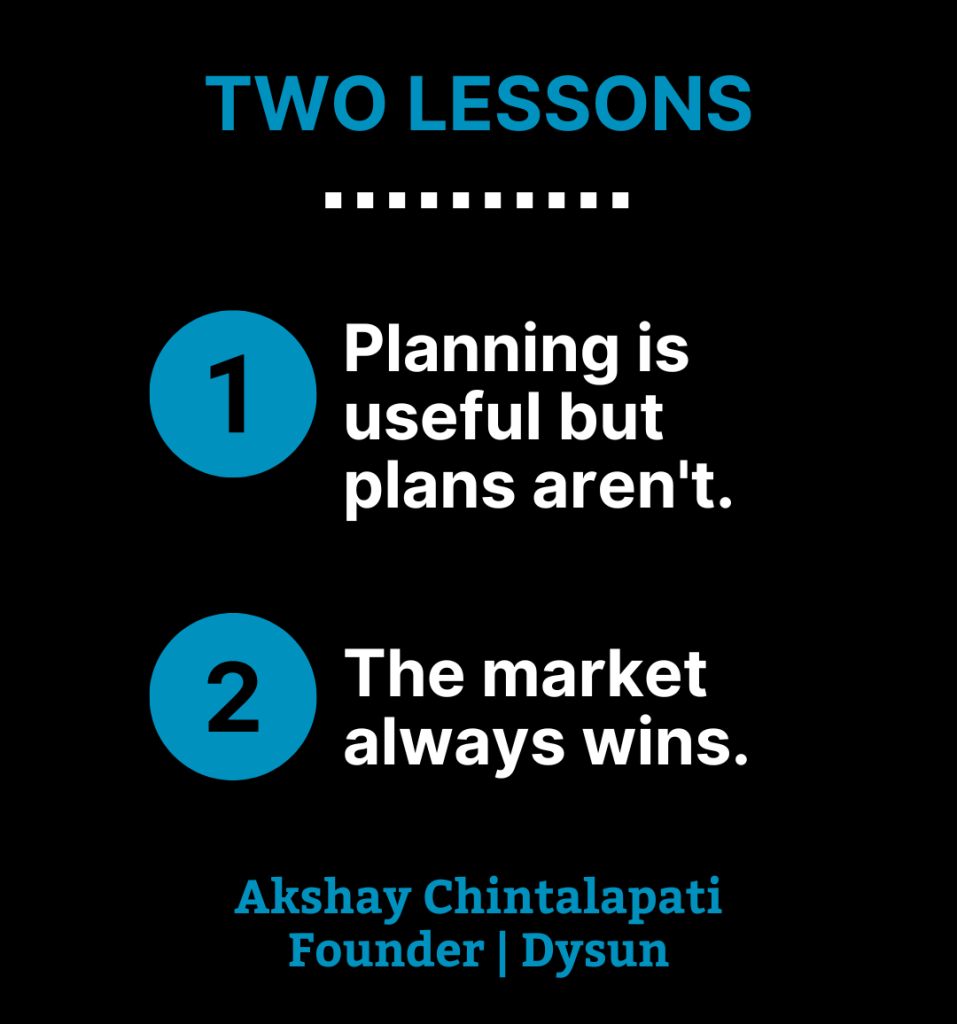 What role does mentorship play in your world (as a mentor or mentee)? Tell us about what makes mentorship valuable to you and your business.
What role does mentorship play in your world (as a mentor or mentee)? Tell us about what makes mentorship valuable to you and your business.
AC: Mentorship to me is learning things to do, avoid, and discover – especially things you aren’t even aware of – by learning from people who have been through a similar journey. Mentorship has played a significant role since I first arrived in the U.S. and continues to do so. When I talk to people who are further along in a journey similar to mine or a path I aspire to take, hearing their experiences helps me learn much faster – both what to do and what to avoid. While you’ll inevitably discover new opportunities and stumble into new problems, these insights help you navigate them better. With each passing year, I find myself becoming a mentor to others taking paths similar to mine, sharing both the knowledge inherited from my mentors and lessons from my own experiences, creating a virtuous cycle of learning and giving back.
Can you share some insights into the market or industry you operate in? How have you navigated challenges and changes in the market landscape?
AC: I operate in the residential solar and energy storage sector. While this market continues to grow due to increasing clean energy adoption and government support, recent headwinds from rising interest rates have led to industry consolidation. I initially focused on solar and storage manufacturers as our primary customers, but quickly realized this meant targeting a segment with only a few major players. This insight drove us to explore and validate broader market segments with more diverse customers.
Many entrepreneurs continue to perfect their daily routines to support their work and greater vision; would you mind sharing your morning routine or a regular ritual that grounds your work each day?
AC: Being a solo founder is a rollercoaster because some days you feel like you’re crushing it, other days you wonder if you’re getting anywhere at all, and it can get difficult to pick yourself up during those times. I was looking for ways to stay steady through these ups and downs, so I recently took on this challenge called 75 Hard where you have to stick to a discipline and complete a bunch of things every day, no excuses. It turned out to be very useful because it helps you realize a lot of things that keep you down are just excuses we give ourselves, that discipline is far more useful than motivation, and most importantly, for giving me the consistent momentum I wanted daily. When you get a few solid wins early in your day, even small ones, it creates this momentum that helps you push through the tough stuff.
How do you manage the work-life balance as an entrepreneur? What strategies have you found effective in maintaining your well-being?
AC: I approach this a bit differently – instead of thinking about work-life balance, I look for ways I can work intensely while avoiding burnout. A YC talk by Daniel Gross called ‘How to Win’ really changed my perspective here, making me question assumptions I had about productivity (for instance, thinking six hours of sleep was sufficient). Three changes that have made a big difference: getting more sleep, taking one day a week to completely ‘unwork’, and setting up my environment to get into a flow state more easily.
Where do you turn for inspiration?
AC: I genuinely believe that there’s inspiration everywhere we look – literally everywhere. The building you see and live in, the street you walk in, the car you drive, the food you eat, the products you use, every single thing was someone’s passion, possibly someone’s life’s biggest achievement, and this applies to even the seemingly mundane things around us. It may be hard to appreciate it since we’re so used to it and always have a million things going on, but we live in incredible times!
Do you have a favorite quote, mantra, or words of wisdom to get through the tough days?
AC: Results make the slog worth it, but it’s also best to find joy in the slog itself, because it’s how you’ll spend most of your time.
What is a problem that keeps you up at night?
AC: Failing to build a product that solves a large enough problem.
How do you think about helping others through your work?
AC: I think about how my work helps people on both sides of the equation. For installers, it means less time stuck on the phone troubleshooting and more time doing what they actually signed up for – installing clean energy systems and being productive at it. For support staff, it means making their workload manageable instead of the burnout-inducing situation many face today.
Have you faced any significant crises in your business, and how did you manage and overcome them?
AC: The biggest challenge I’ve faced so far was realizing my initial target market – solar and storage manufacturers – was too concentrated among a few players. This was significant because it meant rethinking core assumptions about the business. Instead of forcing the original plan, I chose to concede to the market and began exploring broader segments with lower risk and larger upside for growth. While this pivot is still in progress, the key has been staying focused on the core problem we’re solving – helping installers be more productive and preventing support staff burnout.
What advice do you have for fellow (and aspiring) entrepreneurs building and leading teams?
AC: Find something you enjoy doing, rigorously question your assumptions about product, customer, and market, and get comfortable with rejection.
What kind of an entrepreneur do you want to be known as – as in, what do you want your legacy to be?
AC: My life’s goal is to make meaningful contributions towards a radically better future.
.
Do you have someone you’d like to nominate to be profiled in our Faces of Entrepreneurship series? Please let us know by emailing media@thecenter.nasdaq.org or submitting your nomination using this form.
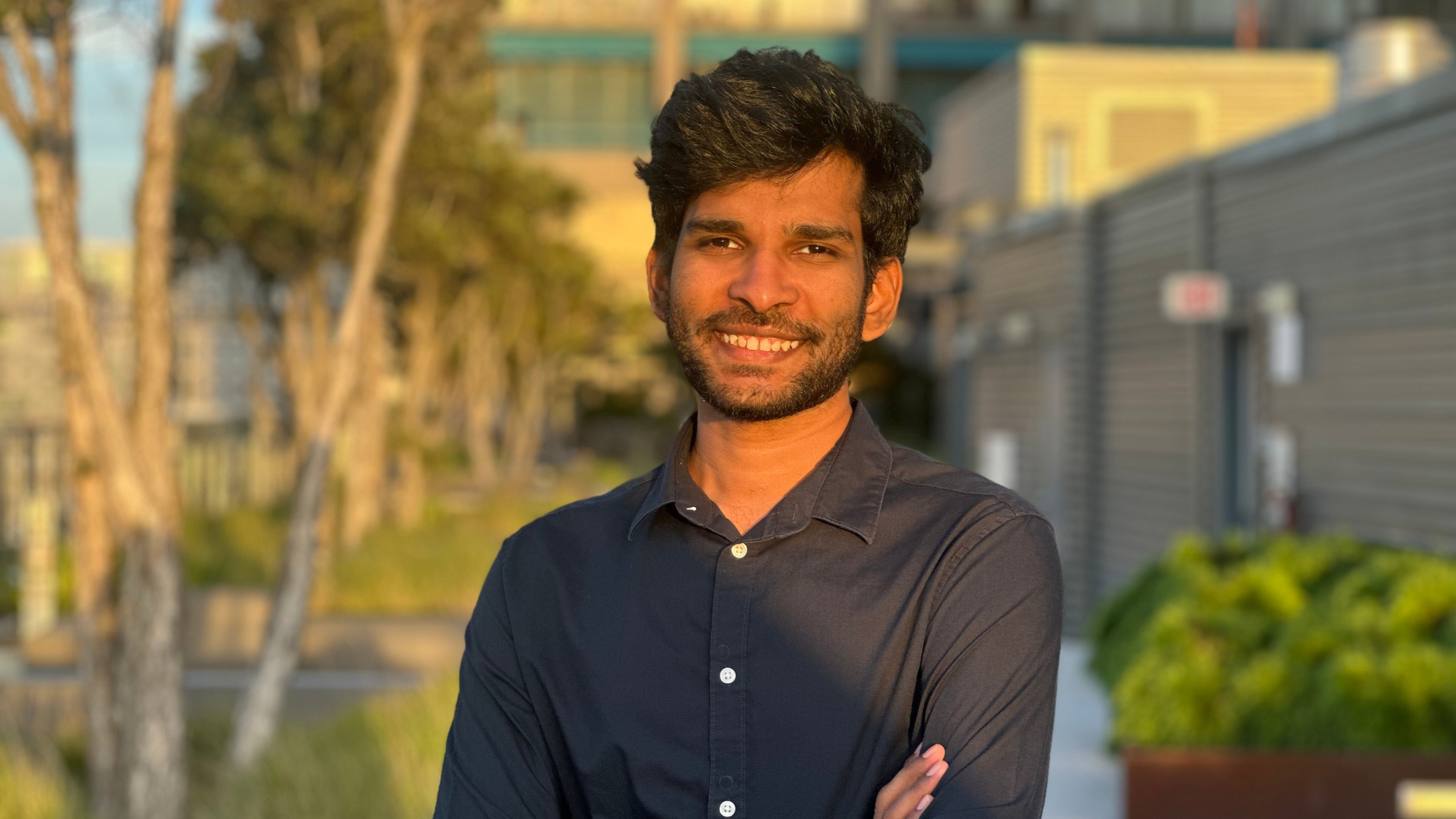
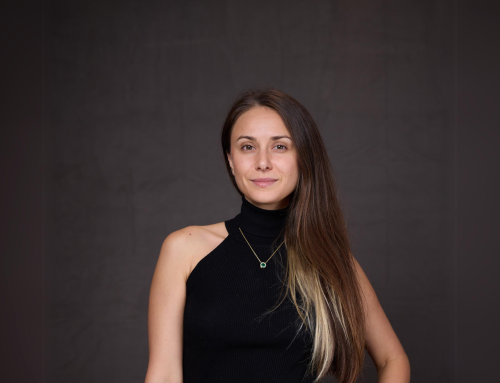

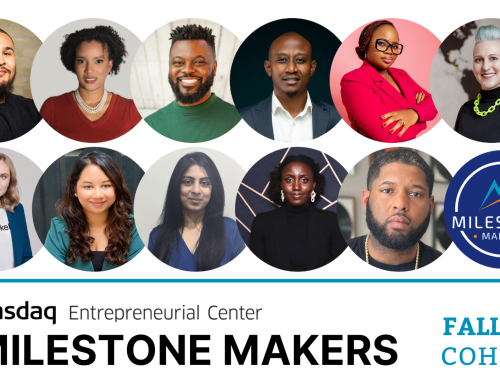
Invite a Friend
Close